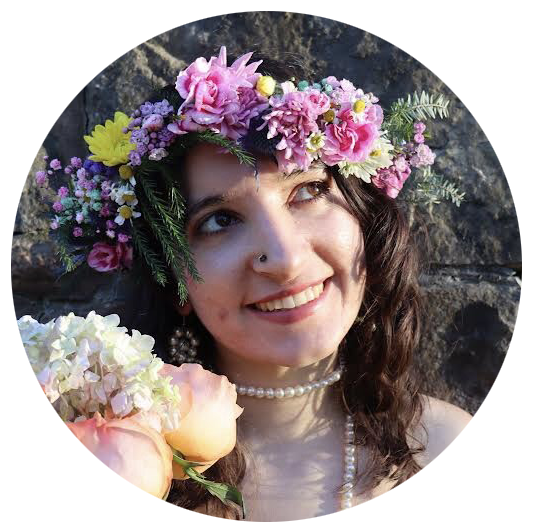Interview with
DJANA KOLAJ
SPRING ISSUE #08 POET
Djana Kolaj is a lifelong creative and admirer of beauty. She was born to Albanian parents in Dublin, Ireland, though presently resides in Connecticut, USA. Her writing strives to reveal the wisdom in nature that has often guided her through living. She is a faithful believer in the innate and organic romance that is abundant in life—a philosophy well reflected in her work. As she weaves words, she aspires to inspire a sensitivity to the sacredness of our senses, and remind us, too, of our belongingness to nature.
Connect with Kolaj on Instagram @the_paperpixie.
SOMETIMES THE SUN DECIDES
to embrace the leaves
of the Norfolk pine
at my window
and the wind may arrive, too,
whispering in cryptic conversation
to the shaded canopy;
some secrets, I suppose.
Then the leaves sway
the length of ballet bodies
dancing, stretching to know
the morning light.
As the limbs linger in my mind,
it was just within that morning moment
when I noticed
I could find
beauty and magic,
mystery and
light
if I too, do decide.
What do you hope readers will take away from this piece?
With this piece, I wish for anyone reading to reflect on whatever small and big things they appreciate, whether physically present or not, and simply take some moments to notice them. I know being attentive to the wonders around us is a challenge, when our attention is often prioritized, manipulated, or distracted by so much stimulus. Yes, I spent quite some time writing about this, but acknowledging beauty can be done with our senses, our presence, or even just a thought.
How does your faith life/ethical outlook inform your writing?
I know that life is not buttercups and rainbows. I grew up witnessing an extreme lack of innocence as a child. I was always a very stubborn optimist, and I psychoanalyze that well, I still am. And perhaps the amount of British Romantic era poetry my teachers read me has something to do with it; but it is my restless belief that life is romantic, and often overwhelmingly beautiful in its intricacies, mysteries, and nature. I flawfully try my best, to follow my faith that to love is to know, and to know is to acknowledge, appreciate, and adore one’s beauty. Be it a person, some sentimental space of the world, a scent, or a memory, there is beauty in all such things we adore, and is that not why we adore them? My very romanticized response to this question should reveal how much this seeps into my writing, haha!
What early experiences taught you that language had power?
My immigrant parents had a limited education, one of whom did not read nor write. They did not read themselves. They had no favorite authors or artists. And so, I was not exposed to books outside of school, really. Reflecting about it now, I often forget that upon moving here, I was placed in a lower-level “reading comprehension assistance” program. So, I suppose my influence was limited for most of my early life, but when I attended fifth grade in America, I became very absorbed by my English classes. I remember every one. I was fascinated with the way the authors my teachers read to me expressed the beauty, curiosities, and abstractness of their minds onto a page. Reading certain sentences would give me goosebumps. The creativity in the way writers wove words together was like witnessing some magic unfold. I cried, I was inspired, I laughed. Some letters on a page had the power to influence some motion of mind and body.
Do you find writing therapeutic?
I do. Writing began as a form of conversation with myself. What started as journaling became prose and poems. I go back to these pieces for guidance. They remind me of myself, of what I believe in, and the life I try to live. When I share my writing, I am really just sharing myself—the gears and gifts of my mind’s movements and mysteries. Those inner workings. This is what art is, isn’t it—an expression of oneself that becomes a conversation between the artist and the world?
What does literary success look like to you?
I have not fully absorbed the idea of becoming a successful writer, because quite frankly it is a sparsely achieved goal. I don’t write for others, I write for myself, and then I share it with others. I do this in hope that someone may feel inspired, connected, or some other motion from my work. I am sharing myself, and seeing what happens. And should this artistic attempt go well, success would be a community of people who appreciate what I offer. In supporting this community with my art, I would like to be supported in some form, so it can become a more prioritized focus that I have the resources to evolve.
Do you think someone could be a writer if they don’t feel emotions strongly?
I know many of us hear the stereotypical artist motif of the tortured soul; the empath who “feels too much.” I can’t deny I might just belong to that category, but there are times I don’t feel as aqueous in my emotions, when I feel more like stone. While every human may not be a writer, we are all creators by nature. There is a place in writing for the “stones” of humanity, too. So many places! People are so much more dynamic and deeply dimensional than a category. So long as one can express themselves in writing, another being is bound to connect. We are more similar than different, ultimately, and the capacity, range, and audience for writing is vast.

